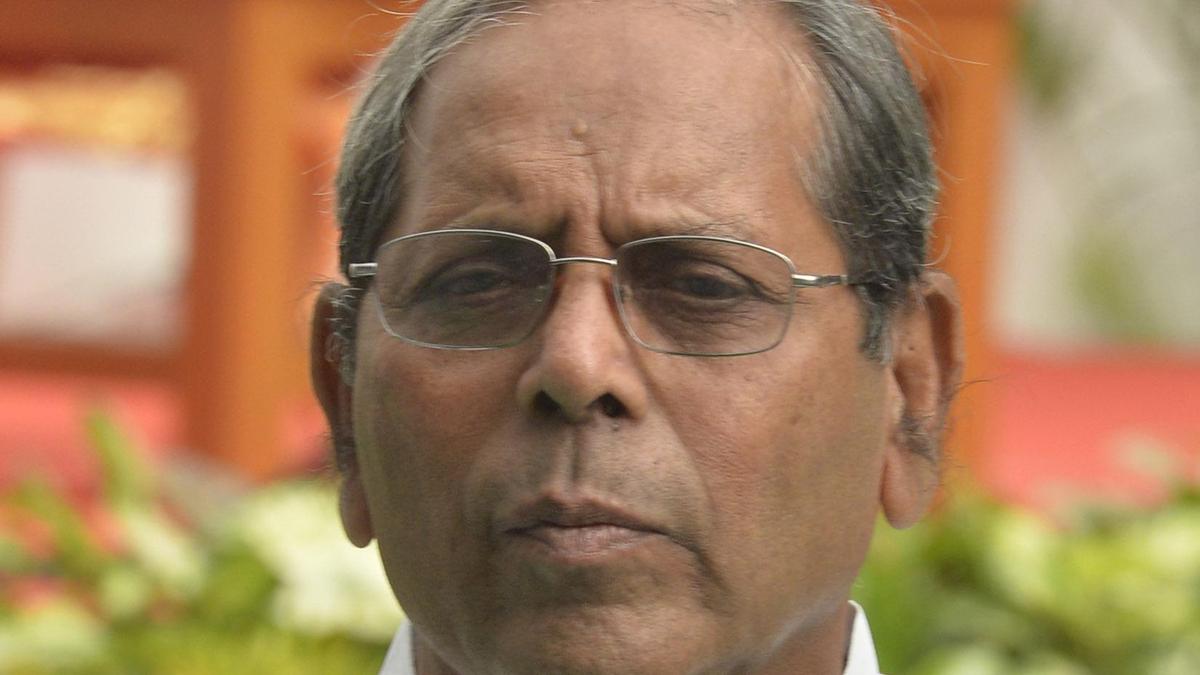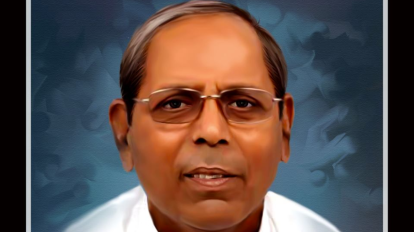When the news broke from Bengaluru late Tuesday evening that former Karnataka minister H.Y. Meti had passed away, a wave of sorrow rippled through the political and social fabric of the state. The veteran Congress leader, known for his calm demeanor, earthy wisdom, and long public service, breathed his last at a private hospital, marking the end of a steady, decades-long career deeply rooted in Karnataka’s grassroots politics.
H.Y. Meti was 78, and for those who followed the evolution of state politics over the last four decades, his name evoked memories of the old guard—a generation of leaders who rose not through social media slogans or corporate optics, but through the sweat of constituency work and a direct connection with the people they served. In the corridors of Dharwad and Bagalkot, his presence had long become synonymous with accessibility and moderation.
Officials confirmed that Meti had been ailing for several weeks, struggling with age-related health complications. His demise, while expected by those close to him, still resonated as a moment of collective pause—a reminder of an era slowly fading from Karnataka’s political landscape. Condolence messages poured in from across party lines. Chief Minister Siddaramaiah, who shared ideological and generational kinship with Meti, described him as “a pillar of grassroots politics who believed in silent service over spectacle.”
Born in the modest surroundings of Bagalkot district, H.Y. Meti’s political journey was intimately entwined with the state’s social movements, cooperative banking networks, and agricultural reforms. He began his career as a teacher, a fact that often shaped his conversational humility and deep respect for public education. Over time, he rose through the ranks of the Congress Party, representing Bagalkot constituency multiple times and holding portfolios that reflected his commitment to social welfare and development without fanfare.

A Life Defined by Steadfast Simplicity
In the crowded world of Karnataka’s shifting power dynamics, H.Y. Meti stood apart for his patience and steadiness. Unlike many of his contemporaries, he rarely courted publicity or indulged in high-octane oratory. His method of politics was quiet, deliberative, and locally anchored. As a lawmaker, Meti favored long dialogues with local cooperatives and community leaders over headline-making press conferences.
During his tenure as the Minister for Excise and before that, as a trusted Congress representative in Bagalkot, Meti’s policy decisions often reflected a blend of pragmatism and compassion. He prioritized schemes for irrigation, farmer credit relief, and land tenancy reforms in north Karnataka. Many of those initiatives, though modest in announcement, persist today as the bones of local welfare infrastructure.
Colleagues recall that Meti never saw politics as spectacle. He embodied an older Karnataka ethos—one drawn from the cooperative movements and mutual respect that defined the early 1980s in the state’s developmental phase. He frequently cited leaders like Devaraj Urs and Veerendra Patil as inspirations, aligning himself more with the quiet reformist tradition than the contemporary model of factional politics.
But Meti’s legacy was not without its blemishes. In 2016, a controversy briefly clouded his long career when a private video involving him surfaced, triggering a personal and political storm. Although he resigned from the cabinet taking moral responsibility, he consistently maintained that he was the target of internal political rivalry. The incident, while sensational at the time, gradually receded from the public memory as Meti retreated into low-profile service in his constituency. Many who knew him personally observed that the episode left him quieter but not bitter.
In later years, he returned to what he knew best—working among farmers, meeting cooperative societies, and attending rural development meetings far from the limelight. Friends describe his later life as one of reconciliation: he sought to reestablish trust with his people by letting deeds replace defenses.
The last few public appearances he made were during local Congress conventions in Bagalkot, where he was greeted more as a respected elder than an active power player. A simple man fond of reading Kannada novels and spending evenings over tea with old colleagues, Meti often expressed discomfort with the aggressive polarization that had come to define newer political styles.
The Final Bow: Reflections and Farewell
By the time H.Y. Meti was admitted to the hospital earlier this month, the veteran leader had spent much of the year away from the public eye. His close aides revealed that he had been quietly mentoring a younger generation of Congress workers, emphasising values over visibility. His passing, they said, marks not just a personal loss but the symbolic departure of a generation that viewed politics as service rather than opportunity.
Chief Minister Siddaramaiah, Deputy Chief Minister D.K. Shivakumar, and several past and present ministers paid their respects at the Bengaluru hospital before the body was moved to Bagalkot for last rites. The Chief Minister recalled their long political association, beginning in the 1980s, when their shared ideological roots in the Congress cooperative movement shaped their friendship. “We have lost a man who understood both the arithmetic and the soul of rural Karnataka,” he said.
Public life in Karnataka has witnessed many such transitions, but the quiet dignity attached to Meti’s farewell stands out. Thousands are expected to attend his cremation, with the state government likely to accord full honors. Flags across government offices in Bagalkot and surrounding districts have been lowered to half-mast.

Followers of Meti’s political approach highlight three key aspects that sustained his influence even after controversies dimmed his prominence. First, his consistent accessibility—people in Bagalkot recall being able to approach his home without appointments. Second, his tendency to bridge divides—he frequently mediated between local Congress factions rather than aggravating them. Third, his belief that public administration should focus on dignity in welfare delivery.
Even his detractors, while critiquing his old-school methods, acknowledged his sincerity. Unlike younger politicians often ensnared by factional battles, Meti’s focus stayed on agricultural cooperatives—a foundation that nurtured growth in one of Karnataka’s most underdeveloped regions. His early initiatives in irrigation management and village micro-financing programs eventually evolved into models used elsewhere in the state.
In conversations with reporters in his final years, Meti occasionally reflected on the changing face of politics. He lamented that younger leaders were “quicker to shout than to listen,” and that “emotion often replaces empathy.” To him, leadership was not about dominating discourse but about nurturing trust. Many who listened to him during these conversations found that sentiment bittersweet but prescient, especially at a time when public discourse has grown divisive.
The Congress leadership, mindful of history, paid tribute to that gentler style of politics. Former Chief Minister Siddaramaiah described him as an “invisible backbone of Karnataka’s democratic institutions.” State Congress President D.K. Shivakumar called him “a cultivated, restrained voice of reason.” Senior BJP leaders too offered condolences, with Union Minister Shobha Karandlaje writing that “Meti’s life stood for service, simplicity, and sincerity.”
In Dharwad, small processions of farmers and cooperative society members began gathering after the news spread. Candle vigils have been organized in Bagalkot to honor his contributions to local welfare. For many in the region, H.Y. Meti was not just another politician—he was a mentor, a listener, and an elder statesman who understood the soil he represented.
In a political era dominated by rhetoric and rivalry, Meti’s departure evokes both nostalgia and introspection. His life offers a humbling lesson on endurance and redemption—how one can remain relevant not through publicity, but through persistence in purpose. Karnataka, amid its shifting alliances and generational change, will likely remember him as part of the vanishing class of leaders who believed in integrity as method, not strategy.
As his body is prepared for final rites in Bagalkot, the atmosphere is solemn yet celebratory of a life that refused to abandon dignity even amid storms. Workers are expected to accompany his cortege on foot, covering the final stretch to his ancestral home. It will be a farewell befitting the man: humble, rooted, and without extravagance.
In the words of one of his longtime associates, “Meti avaru was never louder than the people—he moved with them, not ahead of them.” That perhaps best summarizes his role in Karnataka politics: a constant, unassuming figure who practiced democracy not as performance, but as everyday humanity.
With his passing, a page quietly turns in Karnataka’s political history—a page inked not with ambition, but with patience, service, and the belief that public life, when lived right, can be its own reward.
Followers of Meti’s political approach highlight three key aspects that sustained his influence even after controversies dimmed his prominence. First, his consistent accessibility—people in Bagalkot recall being able to approach his home without appointments. Second, his tendency to bridge divides—he frequently mediated between local Congress factions rather than aggravating them. Third, his belief that public administration should focus on dignity in welfare delivery.

Even his detractors, while critiquing his old-school methods, acknowledged his sincerity. Unlike younger politicians often ensnared by factional battles, Meti’s focus stayed on agricultural cooperatives—a foundation that nurtured growth in one of Karnataka’s most underdeveloped regions. His early initiatives in irrigation management and village micro-financing programs eventually evolved into models used elsewhere in the state.
Follow: Karnataka Government
Also read: Home | Channel 6 Network – Latest News, Breaking Updates: Politics, Business, Tech & More

